2024 NASDA Trade Missions
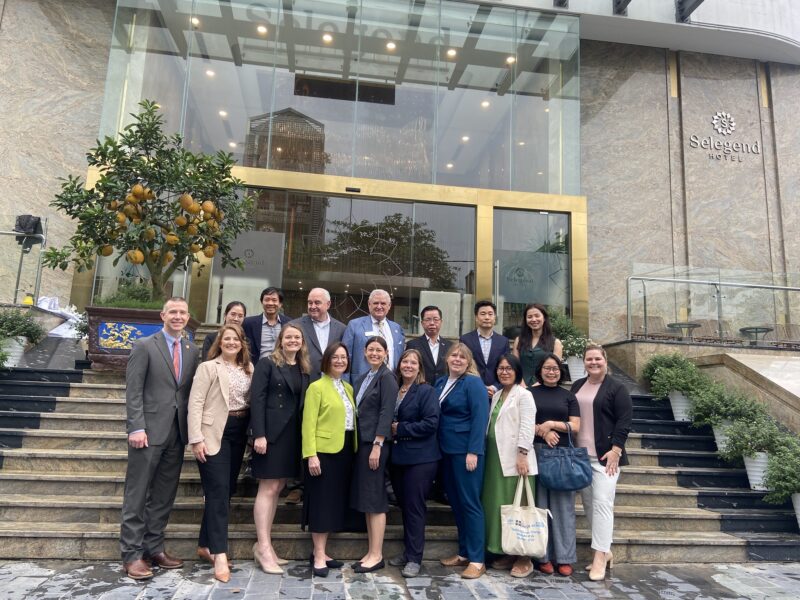 On April 8-12, 2024, NASDA organized a follow-up Emerging Markets Program trade mission to Vietnam after first visiting the market in January 2023. Arkansas Agriculture Secretary and NASDA Vice President Wes Ward, Alabama Agriculture Commissioner Rick Pate, Montana Agriculture Director Christy Clark, Nebraska Agriculture Director Sherry Vinton, Washington State Agriculture Director Derek Sandison and Global Cold Chain Alliance Vice President of International Projects Amanda Brondy led the delegation to further build upon relationships developed in 2023.
On April 8-12, 2024, NASDA organized a follow-up Emerging Markets Program trade mission to Vietnam after first visiting the market in January 2023. Arkansas Agriculture Secretary and NASDA Vice President Wes Ward, Alabama Agriculture Commissioner Rick Pate, Montana Agriculture Director Christy Clark, Nebraska Agriculture Director Sherry Vinton, Washington State Agriculture Director Derek Sandison and Global Cold Chain Alliance Vice President of International Projects Amanda Brondy led the delegation to further build upon relationships developed in 2023.
The trip focused on supply chains and agricultural research in northern Vietnam. Without significant improvements to its supply chain, Vietnam faces continued challenges with food quality, food waste and food safety.
To gain deeper insights into the market and the challenges faced, the group visited several retail outlets in Hanoi including WinMart, MegaMart and Big C along with the Long Bien night market. As Vietnamese consumers begin to transition away from traditional markets, relationships with growing retailers will pay dividends for U.S. producers for years to come.
The delegation also toured the port of Cai Lan and visited with several importers including T&P FreshFoods, Biovegi and Ace Foods. These importers play a pivotal role in developing a reliable cold chain in Vietnam and are eager to import more U.S. products. Reduction of current tariffs would increase this interest even further.
In recognition of the value of technology and knowledge transfer in building stronger trade relationships and providing U.S. producers with the best resources, the group also met with: a leading seed researcher and producer, Thai Binh Seed; the developer of an African Swine Fever vaccine, DABACO; and the National Agriculture Extension Center.
As an additional effort to build relationships with industry and government in Vietnam, NASDA hosted a reception in Hanoi and concluded the week with a meeting with the Ministry of Agriculture and Rural Development Department of International Cooperation. NASDA members offered support to Vietnam in a variety of areas including: supply chain partnerships; technology exchange and information transfer in areas such as seed, fertilizer, pesticides and machinery; natural resource conservation; and education partnerships with U.S. land-grant universities.
This mission follows NASDA’s initial visit to Vietnam in January 2023, where they established relationships and sought opportunities for collaboration and information exchange. A reciprocal visit by a Vietnamese delegation to the U.S. in October 2023 further built rapport and deepened knowledge of the U.S. and Vietnam markets and cultures for both the U.S. and Vietnam delegations. Over the previous 18 months, NASDA has seen significant strengthening in our relationship with both industry and government in Vietnam. NASDA is committed to continuing to grow these relationships as we work to build more diverse markets for U.S. producers around the world.
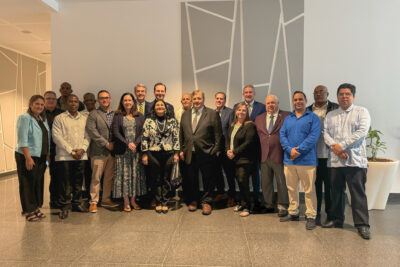 NASDA utilized Market Access Program (MAP) funds from the USDA Foreign Agricultural Service to lead a trade mission to Cuba Feb. 19-21. Connecticut Agriculture Commissioner Bryan Hurlburt, Indiana Agriculture Director Don Lamb, Louisiana Agriculture Commissioner Mike Strain, Maine Agriculture Commissioner Amanda Beal, Minnesota Agriculture Commissioner Thom Petersen, Montana Agriculture Director Christy Clark, South Carolina Agriculture Commissioner Hugh Weathers, NASDA CEO Ted McKinney and FTA International President Ernesto Baron participated in government and private sector meetings in Havana.
NASDA utilized Market Access Program (MAP) funds from the USDA Foreign Agricultural Service to lead a trade mission to Cuba Feb. 19-21. Connecticut Agriculture Commissioner Bryan Hurlburt, Indiana Agriculture Director Don Lamb, Louisiana Agriculture Commissioner Mike Strain, Maine Agriculture Commissioner Amanda Beal, Minnesota Agriculture Commissioner Thom Petersen, Montana Agriculture Director Christy Clark, South Carolina Agriculture Commissioner Hugh Weathers, NASDA CEO Ted McKinney and FTA International President Ernesto Baron participated in government and private sector meetings in Havana.
The mission kicked off with presentations from the Cuban Ministry of Agriculture and Ministry of Foreign Affairs, covering agricultural policy in Cuba and the history of U.S.-Cuba trade and diplomatic relations over the last 20+ years. One of the most influential recent changes was the announcement in 2021 that the Cuban government would allow private enterprises to be legally recognized entities in the Cuban economy. This led to a tremendous emergence of the private sector. Since this change, approximately 10,000 small- and medium-sized enterprises have been established in the country. The delegation then met with the Ministry of Economy and Planning and five Cuban enterprises focused on agriculture and food production.
At the end of the first day, the NASDA delegation was fortunate to visit with the Cuban President Miguel Díaz-Canel and members of his cabinet. The president spoke on how relations with the U.S. have changed over the last three U.S. presidential administrations and the impact of U.S.-Cuba relations on their economy. He also elaborated on the struggles of the COVID-19 pandemic and the food insecurity challenges they face today. Although NASDA has no impact on governmental relations, the delegation emphasized its desire to build relationships and develop bilateral trade that supports the development of the private economy in Cuba and reduces food insecurity.
Site visits continued the next couple days, including to a ration center that explained how food is distributed, a logistics center, a national food processor and a farm cooperative facility. The delegation also met with U.S. Embassy staff in Havana to debrief the government meetings and gain perspective from the market. To conclude the mission, the NASDA delegation hosted a press conference where reporters from several media outlets asked about takeaways from the trade mission and the next steps forward.
NASDA kicked off 2024 with an Emerging Markets Program trade mission to Morocco Jan. 8-12. Illinois Department of Agriculture Director Jerry Costello II, Kansas Department of Agriculture Secretary Mike Beam, Massachusetts Department of Agriculture Commissioner Ashley Randle, South Carolina Department of Agriculture Commissioner Hugh Weathers, NASDA CEO Ted McKinney, and Almond Board of California Vice President of Global Technical & Regulatory Affairs Julie Adams participated in government and industry meetings in Rabat and Casablanca.
The mission began at the U.S. Embassy in Rabat with the delegation meeting with Ambassador Puneet Talwar, as well as representatives from the USDA Foreign Agricultural Service, U.S. Commercial Service, and the U.S. Department of State to gain an understanding of the market and relationship between the U.S. and Morocco. This provided valuable insight that helped NASDA members have deep discussions with importers, agricultural associations and producers throughout the week.
Another high-priority topic was the former “Green Morocco Plan,” now continued under the name of “Generation Green 2020-2030.” As Morocco deals with climate change in record temperatures and an ongoing five-year drought, the country has experienced increased food insecurity, inflation in food prices and reliance on imports. This new strategy hopes to address these challenges for the agricultural sector and the Moroccan consumer. It also develops incentives for junior professional and entrepreneurship development to expand the talent working to identify solutions.
The U.S.-Morocco Free Trade Agreement and the geographic proximity across the Atlantic Ocean make Morocco an accessible market for U.S. exporters. Throughout the mission, several meetings mentioned Morocco being the first state to publicly acknowledge the independence of the U.S. from Great Britain in 1777. Although there is heavy European influence in Moroccan culture and business processes, they are extremely interested in strengthening their business ties to the U.S. American agriculture must prioritize consistently building these relationships to demonstrate the quality and accessibility of U.S. products.
2023 NASDA Trade Missions
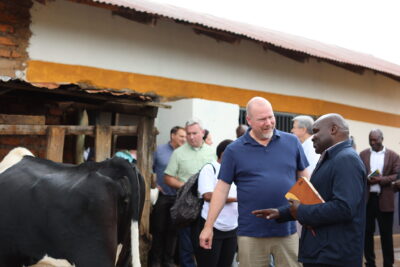 NASDA members Commissioner Amanda Beal (Maine), Commissioner Ryan Quarles (Kentucky) and Secretary Randy Romanski (Wisconsin) along with Bayer Global Head Partnerships-Growers Engagement and AgriChain Activation Jennifer Crall and Chuck Penry and Associates President Charles Penry traveled to Kenya for the last trade mission of the year.
NASDA members Commissioner Amanda Beal (Maine), Commissioner Ryan Quarles (Kentucky) and Secretary Randy Romanski (Wisconsin) along with Bayer Global Head Partnerships-Growers Engagement and AgriChain Activation Jennifer Crall and Chuck Penry and Associates President Charles Penry traveled to Kenya for the last trade mission of the year.
NASDA’s trip gave members the opportunity to see firsthand the opportunities in the country, and provided clear next steps on how U.S. industry, academia and government can collaborate. Following the trip, staff convened other groups working in Kenya. Meetings with U.S. cotton and grain industry have explored how Kenya’s interest in biotechnology can benefit growers; animal agriculture and livestock genetic groups have discussed ways to bolster resiliency and performance in Kenyan production; and NASDA has been joined by the Association of Public and Land-Grant Universities in exploring how critical extension services can be amplified in country to propel the adoption of new and innovative technologies.
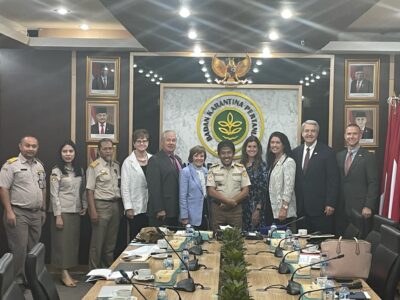 NASDA’s Emerging Markets Program trade mission to Indonesia took place August 4-11. NASDA President and Oklahoma Agriculture Secretary Blayne Arthur, Arkansas Agriculture Secretary Wes Ward, New Mexico Agriculture Secretary Jeff Witte, Massachusetts Agriculture Commissioner Ashley Randle, California Agriculture Secretary Karen Ross, NASDA CEO Ted McKinney and U.S. Dairy Export Council President & CEO Krysta Harden participated in government and industry meetings.
NASDA’s Emerging Markets Program trade mission to Indonesia took place August 4-11. NASDA President and Oklahoma Agriculture Secretary Blayne Arthur, Arkansas Agriculture Secretary Wes Ward, New Mexico Agriculture Secretary Jeff Witte, Massachusetts Agriculture Commissioner Ashley Randle, California Agriculture Secretary Karen Ross, NASDA CEO Ted McKinney and U.S. Dairy Export Council President & CEO Krysta Harden participated in government and industry meetings.
The delegation kicked off the mission in Jakarta by meeting with U.S. Ambassador Sung Kim. The meeting delved into critical agriculture topics including animal care standards, expediting dairy facility registration and the strong desire of Indonesians to do business with the U.S. the NASDA delegation and Indonesian leaders emphasized further relationship building is crucial to increasing trade and building trust between the countries and the importance of return trips to Indonesia, and reverse trade missions to the United States cannot be overemphasized. The greatest challenge facing the U.S. – Indonesia partnership is the Halal certification requirement. Effective October 2024, the U.S. dairy industry will need to re-certify over 120 dairy processors that currently export to Indonesia. Aside from diary, there is great potential for soybeans, aquaculture, dried fruit and nuts and livestock (bovine) genetics.
NASDA continued its mission by hosting a reception with 80 importers, government officials, and in-country industry leaders. To conclude the mission, the delegation held meetings with industry representatives, fellow FAS cooperators in the market, and the Indonesian Food & Beverage Association (GAPMMI).
NASDA’s trade missions through the USDA Emerging Markets Program serve to not only open doors to new markets but also enhance diplomatic ties, foster economic growth and contribute to a stable and resilient supply chain. NASDA will continue to conduct trade missions like this one to work for the continued expansion of international trade and collaboration.
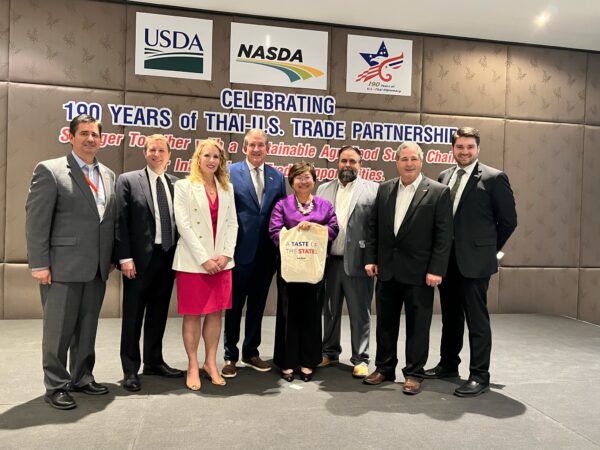 NASDA’s second Emerging Market Program mission was in March to Thailand. Commissioner Hugh Weathers, Commissioner Doug Goehring, Director Jerry Costello II and New Mexico Marketing Director Jason New joined National Grain and Feed Association President and CEO Mike Seyfert for a week in Bangkok with NASDA.
NASDA’s second Emerging Market Program mission was in March to Thailand. Commissioner Hugh Weathers, Commissioner Doug Goehring, Director Jerry Costello II and New Mexico Marketing Director Jason New joined National Grain and Feed Association President and CEO Mike Seyfert for a week in Bangkok with NASDA.
The group met with the Permanent Secretary for the Ministry of Agriculture and Cooperatives as well as leadership from the Office of Agricultural Economics and the Department of Agriculture. The challenges facing Thai agriculture were strikingly similar to those faced by agriculture in the U.S. There were specific requests for help in communicating with FDA and for technical support for Thai cooperatives to generate more value-added opportunities for Thai farmers. The group also toured the Laem Chabang Port Plant Quarantine Station where there was a request from the port leadership for support to improve training for their inspectors.
Over the course of the week, the group met with several Thai businesses in the food and agriculture sector including KCG Corp, Heritage Snacks & Food Co., Jagota Brothers Trading Co., the ASEAN Business Council, and C.P. Group, the largest feed company in the world.
NASDA also hosted a reception at VIV Asia, Asia’s leading international trade show for animal production and processing. The reception included Thai government leaders, Thai importers, U.S. cooperators, and exhibitors from the show. During the reception, Mike Seyfert provided an overview of improvements the U.S. has made and continues to make in the supply chain. As both an importer of U.S. goods and a large exporter to the U.S., delays at ports in the U.S. have caused issues for Thai businesses.
Thanks in large part to the support of the U.S. Department of Agriculture Foreign Ag Service post in Bangkok, the mission was a success in building relationships and positioning the US to be Thailand’s preferred trade partner. The week ended with lunch with the U.S. Ambassador to Thailand, Robert F. Godec, who voiced a commitment to expanding opportunities for US agricultural products in the region.
NASDA staff will be working closely to complete additional surveys in the country to inform our next steps. These trips are just the first step in building relationships to grow market opportunities for our producers around the world.
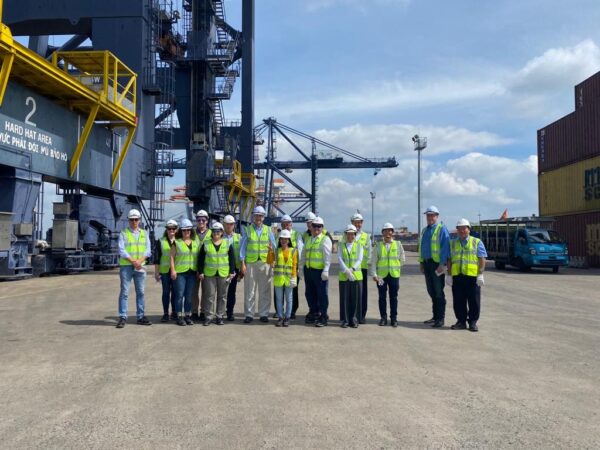 NASDA’s first Emerging Markets Program trade mission took place in Vietnam on January 9-13, 2023. NASDA President and Wyoming Department of Agriculture Director Doug Miyamoto, Washington State Department of Agriculture Director Derek Sandison, Delaware Secretary of Agriculture Michael Scuse, Texas Department of Agriculture Assistant Commissioner Dan Hunter, NASDA CEO Ted McKinney, and American Feed Industry Association President & CEO Constance Cullman participated in government and industry meetings in both Hanoi and Ho Chi Minh City.
NASDA’s first Emerging Markets Program trade mission took place in Vietnam on January 9-13, 2023. NASDA President and Wyoming Department of Agriculture Director Doug Miyamoto, Washington State Department of Agriculture Director Derek Sandison, Delaware Secretary of Agriculture Michael Scuse, Texas Department of Agriculture Assistant Commissioner Dan Hunter, NASDA CEO Ted McKinney, and American Feed Industry Association President & CEO Constance Cullman participated in government and industry meetings in both Hanoi and Ho Chi Minh City.
The delegation kicked off the mission in Hanoi by meeting with the Vietnamese Ministry of Agriculture and Rural Development, including Vice Minister Phùng Đức Tiến. The meeting covered topics such as the progression of the Vietnamese economy and market access for agricultural products such as animal feed and grapefruit. NASDA emphasized the importance of bilateral trade relations and its support for developing the Vietnamese economy. Before leaving Hanoi, NASDA hosted a reception that included attendees from several Vietnamese businesses with an interest in U.S. agricultural products and government officials. The reception gave NASDA members the opportunity to connect with potential customers of products produced in their respective states.
NASDA continued the mission in Ho Chi Minh City by hosting a luncheon with over 25 Vietnamese business representatives focused on cotton, dairy, grains, beef, tree nuts, lumber, and fresh fruit. Trade delegates also met with Central Retail Vietnam, the Handicraft and Wood Industry Association, and the U.S. Grains Council team focused on Southeast Asia. Each of these visits was valuable for better understanding the growth of the market, the political dynamics of the region, and non-tariff barriers impacting market access for U.S. agriculture.
It is critical that we continue to show up in these markets and that the outreach does not end at the conclusion of the mission. NASDA and the participating trade delegates will build upon connections made and seek answers for potential trade barriers that were identified.
Emerging Markets Program
Learn more about NASDA’s Emerging Markets Program trade missions from NASDA Sr. Director of International Trade Programs Megan Weeks.
In 2022, the National Association of State Departments of Agriculture was awarded $925,000 through the United States Department of Agriculture Foreign Agricultural Service Emerging Markets Program. The Emerging Markets Program helps organizations promote exports of U.S. agricultural products to developing countries with strong growth potential.
